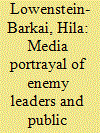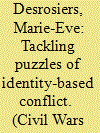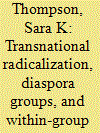|
|
|
Sort Order |
|
|
|
Items / Page
|
|
|
|
|
|
|
| Srl | Item |
| 1 |
ID:
120325


|
|
|
|
|
| Publication |
2013.
|
| Summary/Abstract |
No matter how unlikely it may seem, radical Leftists and Islamists have come closer in recent years. Drawing on substantial ideological interchange, and operating at both state and non-state levels, the two movements are building a Common Front against the United States and its allies. In this article, we use framing theory to examine the contemporary convergence of political Islam and the radical Left. Both radical Leftists and Islamists have utilized the master frame of anti-globalization/anti-capitalism and the master frame of anti-colonialism/anti-imperialism to elicit support from the widest possible range of people. The emerging Red-Green alliance presents a complex challenge that will require careful attention from U.S. and European policymakers.
|
|
|
|
|
|
|
|
|
|
|
|
|
|
|
|
| 2 |
ID:
166770


|
|
|
|
|
| Summary/Abstract |
In the early morning of 3 August 2014, Islamic State of Iraq and Syria (ISIS) attacked the Sinjar district in the vicinity of Mosul. The area was largely under the control of Kurdish forces at the time, especially those associated with the Kurdistan Democratic Party (KDP). Those forces could not defend the district and ISIS was able to take control of the area. Consequently, a considerable number of Yazidi people were killed or displaced, while female Yazidis were raped and kidnapped. This study, based on framing theory, attempts to explain how two major Kurdish media organizations, Rudaw, which is loyal to KDP, and the Kurdish News Network (KNN), which is loyal to the Gorran (Change) Movement, each covered the event in their news reports. By performing a content analysis of 222 news stories covering the event, the key finding of the research is that, in instances of assigning responsibility for the fall of Sinjar, political considerations are the determining factor in how the narrative was framed. Taken as part of a growing literature on media in Kurdistan, the research outlined in this article supports the conclusion that the framing of media coverage in the Kurdistan Region is subject to strong political bias and media organizations support the political narratives advanced by their political patrons, as it is the case in many other Middle Eastern countries.
|
|
|
|
|
|
|
|
|
|
|
|
|
|
|
|
| 3 |
ID:
171695


|
|
|
|
|
| Summary/Abstract |
Despite the growing number of studies analysing the role of media in peace processes, there is almost no literature on the relationship between media and public opinion during peace processes. This article examines this question using the case study of the Oslo Accords. Specifically, it analyzes the compatibility between media portrayals of Yasser Arafat and Yitzhak Rabin and Israeli and Palestinian public support for peace negotiations. The findings indicate that (a) the enemy’s binary image may change positively following the signing of peace agreements; and (b) this change may accelerate emerging peace processes.
|
|
|
|
|
|
|
|
|
|
|
|
|
|
|
|
| 4 |
ID:
144449


|
|
|
|
|
| Summary/Abstract |
This article assesses explanations of identity-based violence, evaluating in particular framing theory's strengths. It argues that framing specifies some of the key mechanisms and processes between factors too often studied in vacuum: the purposefulness of human beings, social structures, as well as environmental factors and opportunities. Framing therefore suggests answers to the main puzzles in conflict studies and enjoys a broader explanatory reach than existing perspectives because it coherently integrates existing theoretical insights, as well as takes us beyond them.
|
|
|
|
|
|
|
|
|
|
|
|
|
|
|
|
| 5 |
ID:
166676


|
|
|
|
|
| Summary/Abstract |
In recent years, the Tamil and Somali diasporas have come under intense scrutiny by the media and national security agencies in Canada. This is due to concerns that members of both communities may hold political grievances associated with their respective homelands that could be acted upon by joining or supporting transnational terrorist groups. Drawing on 168 in-depth interviews with youth and young adults in Toronto’s Tamil and Somali diasporas, we provide a comparative analysis of the varying ways that existing sentiment pools can operate to mobilize broad-levels of support for, or vilification of, the framing strategies of the LTTE and al Shabaab, respectively. Our findings show that frames that portray the LTTE in a positive light resonate deeply with the young Tamil-Canadians we interviewed, characterizing a “narrative fidelity” between these frames and the existing sentiment pool. By contrast, there exists considerable disconnect between the framing strategies of al Shabaab, their supporters, and existing sentiment within the Somali diaspora – a divide that illustrates the notion of “framing failure”. We conclude with a discussion of the dynamic nature and inherent malleability of group-level sentiment pools, and highlight why this may be important from a national security standpoint.
|
|
|
|
|
|
|
|
|
|
|
|
|
|
|
|
|
|
|
|
|